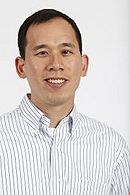Difference between revisions of "Jeffrey Chuang"
| (9 intermediate revisions by the same user not shown) | |||
| Line 1: | Line 1: | ||
[[File:130px-Jeff_Chuang_2-2014.jpg]] | [[File:130px-Jeff_Chuang_2-2014.jpg]] | ||
| − | + | I study problems at the intersection of mathematical modeling, tissue biology, and computational data science. I received my BA in Chemistry and Physics from Harvard, followed by a Ph.D. in theoretical physics at MIT , where I studied protein folding, DNA biophysics, and the statistical mechanics of polymer gels with Toyoichi Tanaka, Alexander Grosberg, and Mehran Kardar. I moved into computational biology during my postdoc at UC San Francisco with Prof. Hao Li in the Biochemistry and Biophysics Department. There I trained in the molecular evolution of genomes and gene regulatory processes. I was a junior faculty in the Biology Department at Boston College then joined the Jackson Laboratory for Genomic Medicine in Fall 2012. I am a Professor at JAX-GM and hold joint appointments in the UCONN-Health Department of Genetics and Genome Sciences and the University of Connecticut Department of Computer Science and Engineering. I have longtime interests in science communication and education, developed out of prior work as a AAAS Mass Media Fellow. As of 2023, I am Deputy Director of the JAX Cancer Center and a faculty advisor to the JAX Computational Sciences scientific services group. | |
| + | |||
| + | My research interests (Jan. 2023) are in computational approaches for biological data analysis, especially: development of interpretable methods in deep learning-based tissue image analysis; comparative analysis of tissue imaging modalities such as H&E, CODEX, spatial transcriptomics, and multiplex FISH in cancer; cancer genomics and gene regulation; and the use of patient-derived cancer models to generate clinical trials. My lab's research has been supported by organizations including the National Institutes of Health, the National Science Foundation, the Hope Foundation, and the PhRMA Foundation. The lab's current funding includes grants for the NCI Data Commons and Coordination Center of the Patient-Derived Xenograft Network Consortium, the NCI PIVOT pediatric cancer testing consortium, the NIH Senescence Network Consortium, as well as other projects on intratumoral heterogeneity, image analysis, and characterization of aging-dependent tissue microenvironments. | ||
Latest revision as of 13:32, 12 November 2024
I study problems at the intersection of mathematical modeling, tissue biology, and computational data science. I received my BA in Chemistry and Physics from Harvard, followed by a Ph.D. in theoretical physics at MIT , where I studied protein folding, DNA biophysics, and the statistical mechanics of polymer gels with Toyoichi Tanaka, Alexander Grosberg, and Mehran Kardar. I moved into computational biology during my postdoc at UC San Francisco with Prof. Hao Li in the Biochemistry and Biophysics Department. There I trained in the molecular evolution of genomes and gene regulatory processes. I was a junior faculty in the Biology Department at Boston College then joined the Jackson Laboratory for Genomic Medicine in Fall 2012. I am a Professor at JAX-GM and hold joint appointments in the UCONN-Health Department of Genetics and Genome Sciences and the University of Connecticut Department of Computer Science and Engineering. I have longtime interests in science communication and education, developed out of prior work as a AAAS Mass Media Fellow. As of 2023, I am Deputy Director of the JAX Cancer Center and a faculty advisor to the JAX Computational Sciences scientific services group.
My research interests (Jan. 2023) are in computational approaches for biological data analysis, especially: development of interpretable methods in deep learning-based tissue image analysis; comparative analysis of tissue imaging modalities such as H&E, CODEX, spatial transcriptomics, and multiplex FISH in cancer; cancer genomics and gene regulation; and the use of patient-derived cancer models to generate clinical trials. My lab's research has been supported by organizations including the National Institutes of Health, the National Science Foundation, the Hope Foundation, and the PhRMA Foundation. The lab's current funding includes grants for the NCI Data Commons and Coordination Center of the Patient-Derived Xenograft Network Consortium, the NCI PIVOT pediatric cancer testing consortium, the NIH Senescence Network Consortium, as well as other projects on intratumoral heterogeneity, image analysis, and characterization of aging-dependent tissue microenvironments.


